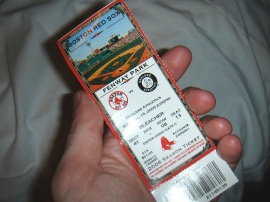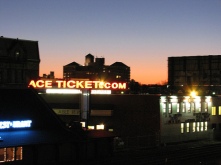Got Tickets?
 Aticket to a Red Sox game. There?s nothing quite like holding one in
Aticket to a Red Sox game. There?s nothing quite like holding one in
your hands. It?s that sublime feeling of knowing a Fenway Park
experience lies in your future. The anticipation is palpable.
Regardless of whether the Sox eventually win or lose, with a ticket to
a game, you?re guaranteed the thrill of watching Big Papi and Manny
stride into the on-deck circle; the roar of the crowd following a
spectacular defensive play; the majesty of the Green Monster looming in
left field; two choruses of Sweet Caroline and its euphoric chant, ?So
Good! So Good! So Good!? And for many of us, there?s Fenway?s
time-capsule quality that transports us back to our childhoods and
reconnects us with our parents, or the spirits of our parents who have
passed away, and re-ignites in us the joy of being alive.
And this was all true BEFORE the Red Sox ever won a World Series. Now, when we go to Fenway, we get to see the World Champions!
No wonder it?s so hard to get a ticket. Yes, demand for tickets is
through the roof, and the Red Sox continue to price their tickets at
levels well below ?market value? in order to keep a Fenway Park
experience accessible to the ?average fan.? In addition, ticket supply
is low ? we have the smallest stadium in Major League Baseball and 81
home games just isn?t enough to satisfy our fans? hunger. And as any
college professor of economics will tell you, these three forces (along
with complete lack of enforcement of scalping laws) make a ?secondary
market? for tickets inevitable. So that?s what we have in Red Sox
Nation: a robust, flourishing, highly profitable  market for Red Sox tickets that have already been sold once by the team.
market for Red Sox tickets that have already been sold once by the team.
Almost nobody loves the ticket reselling ("scalping") industry. Yet,
as I see it, there are only a handful of ways the Red Sox could combat
ticket resellers, and almost all of them seem silly:
1) The Sox could price all seats at fair market value. That would mean a ?dutch auction?
for every ticket, which would lead to prices of at least $500 per seat
for every game. Yes, that includes bleachers and standing room only.
This would kill the reselling industry?s interest in Sox tickets
because, theoretically, no ticket would be sold initially for an amount
less than its highest potential bid.
2) The Red Sox could start to lose more games than they win, which would diminish demand.
3) The Red Sox could tear down Fenway and build a stadium with
100,000 seats. This would probably curtail demand (Fenway is an
attraction, regardless of how well the team plays) and also increase
ticket supply.
4) The Red Sox could petition Major League Baseball to play all
their games at home. If they were successful, this would double the
supply of tickets. Likewise, they could petition the league to play 50
home games against the Yankees, to make these tickets less special.
5) The Red Sox could revoke all season ticket holders? seats. Season
ticket holders are currently the biggest supplier of the ?secondary
market? (after all, who has time to attend every home game?) and
putting more tickets back under control of the team would take a huge
bite out of resellers? inventory and would allow the Red Sox to find
more ?unique? fans to sell them to ? fans who would be more likely to
actually use the tickets rather than resell them.
6) The state of Massachusetts could enforce the law against
reselling tickets at more than $2 of their face value. Which, it
appears, will never happen.
Short of these drastic measures, however, there are proactive ways
to combat the reselling industry and get tickets into the hands of
?regular fans,? and the Red Sox use almost all of them. They:
1) Place strict ticket limits on ticket-buying customers (other than
season ticket holders) to ensure a large number of ?unique? buyers.
2) Hold several ?random drawings? before and during the season,
which gives lucky fans the right to purchase online highly coveted
Green Monster seats, Right Field Roof Deck seats, Yankee Game seats,
and even playoff and World Series seats. (I have "won" Red Sox email
drawings three times over the years, proving that it really does work.)
3) Host a ?scalp-free zone? outside Fenway, which enables fans to
sell their tickets at face value on the day of the game. Buyers of
these tickets are required to enter Fenway immediately after buying a
ticket, to ensure the tickets don?t get resold for a profit.
4) Sell ?day of game? tickets at Gate E, beginning two hours before game time.
5) Announce the sale of new blocks of tickets at random times before and during the season.
6) Set technological traps to foil resellers in the online ticket-buying process.
Consider this: By keeping ticket prices well below their actual
market value, the Red Sox are effectively offering ?financial aid? to
every person who buys a ticket directly from them. Absurd, you say? Not
really. If the actual value of a particular ticket is $500 on the open
market, and the Red Sox know this yet choose to sell this ticket for
$80, they are purposefully offering financial aid of $420 to the buyer
of that ticket. And they do this for the same reason that Harvard does
it, or Andover, or any other expensive educational institution: because
they don?t want their customer base to consist solely of wealthy people.
There?s a moral angle here, to be sure, but there?s also a long-term business angle. If the Sox were to maximize their profit now
by selling tickets at their actual market value (which would terminate
the secondary market for Sox tickets), the economic diversity of their
fan base would diminish. Consequently, if the team were to hit hard
times in the future (i.e., they begin to lose more games than they win?
uncomfortable to imagine, I know), they would have a difficult time
selling tickets at the exorbitant prices leftover from the glory days
of 2008 and would probably have to slash prices. In addition,
attracting back the millions of fans who were disillusioned by their
lack of access to games might be a major challenge.
 A
A
few days ago, the Red Sox signed a sponsorship agreement with Ace
Ticket and proclaimed them ?the official ticket reseller of the Boston
Red Sox.? Yes, it?s crummy that ANY team has an ?official ticket
reseller,? but to put in perspective how established the ticket
reselling industry is in 2008, keep in mind that Major League Baseball
itself has partnered with StubHub, another ticket reseller, as the
official ticket reseller of Major League Baseball. The entire LEAGUE is
profiting from the ticket reselling industry — it’s not just the Red
Sox.
To the Red Sox? credit, last year they instituted a program called
?Red Sox Replay? that enabled season ticket holders to resell their
tickets online at virtually face value (fans could log on and buy
tickets at a markup of approximately 25%, a small percentage of which
went to the Red Sox for maintenance of the site). But the moment MLB
inked their exclusive deal with StubHub, the Sox were forced to tear
down Replay, since it competed with StubHub?s interests. As Sam
Kennedy, the Sox’ chief Marketing and Sales officer, told The Boston Globe
earlier this week, without Replay, the Sox felt compelled "to identify
and endorse a secure and reputable secondary market option" for their
season ticket holders.
It?s also important to point out that the Red Sox have not provided
Ace with "tickets for resale" as part of their deal, and the Sox do not
stand to profit from a single ticket that Ace sells. This is a straight
advertising deal – the team is simply accepting a large check from Ace
Ticket for sponsorship (and, we trust, investing this back into the
team on the field), and they have sent a letter to their season ticket
holders recommending Ace Ticket as the team?s reseller of choice.
That?s it.
 Now
Now
if Abe Lincoln owned the Red Sox, would he have signed a sponsorship
agreement with Ace? No. What about A. Bartlett Giamatti, the former
commissioner of baseball who was as principled a man as ever lived
(he?s the guy who banned Pete Rose from baseball). Would Bart have
signed a sponsorship agreement with Ace? Probably not. Abe and Bart
would have eschewed any deal that appeared to link their team with
scalpers.
On the other hand, neither of these men were successful businessmen, and neither would ever
have been picked to run a major league baseball team. The Red Sox are
not only our beloved Olde Towne Team, they are a business. ?Good
business? helped us win it all in 2004 and 2007, and good business will
help us win in the future, as well. It?s hard to fault the business
people at the Red Sox for pocketing an easy endorsement check (and
offering a "benefit" for season ticket holders) when not doing
so would (arguably) jeopardize our competitiveness in the American
League East. The money the Sox are making from the Ace Ticket deal
will help them put the highest quality team on the field for 2008 and
beyond. Yup, winning really does have a steep price.
While down here in Fort Myers, I had a chance to talk about all of
this with Ron Bumgarner, Red Sox VP of Ticketing, for about 30 minutes.
And what I?ve concluded is that his job is different from that of every
other VP of Ticketing at every other MLB franchise. While other teams
are busy trying to sell as many tickets as they can at the highest
possible prices, the Red Sox are trying to sell all of their
tickets at a discount (theoretically) to as many unique, regular fans
as is possible, and working assiduously to thwart ticket resellers at
the same time (yes, even though they just advised their season ticket
holders to sell their unused tickets to Ace, the Sox will continue to
try to keep  other individual tickets out of Ace’s and other resellers’ hands). Profit was Ron’s main concern when he ran ticketing for the San Diego Padres, but here at the Red Sox, profit takes a back seat to equitability and wide distribution of tickets across Red Sox Nation’s loyal citizenship.
other individual tickets out of Ace’s and other resellers’ hands). Profit was Ron’s main concern when he ran ticketing for the San Diego Padres, but here at the Red Sox, profit takes a back seat to equitability and wide distribution of tickets across Red Sox Nation’s loyal citizenship.
And you just have to trust me when I tell you that Ron is committed
to keeping Fenway accessible to ?regular fans.? He has a couple of
young children of his own, and I know he relates personally to the
"regular fan" whose parents brought him/her to games at Fenway during
childhood, and now wants to bring his/her kids to the park, too. "It’s
a complicated problem," Ron told me, "But since it means the Red Sox
are winning games, it’s a good problem in the end."Right?
http://www.box.net/static/flash/widget_player.swf
Get your own Box.net widget and share anywhere!
To download my song I’m a Member of Red Sox Nation for free, or to see the YouTube music video for this song, visit www.crawdaddycove.com.
A couple of years ago I went to see a English Premier League Match at West Ham United. The ticketing process there seemed a bit complicated at first glance but ultimately turned out to be a brilliantly simple solution to scalping.
To go to a game what you first needed to do was become a member of their Fan Club (Buying a ticket did this automatically). As a member of the Fan club you were issued a credit card like membership card that had a rfid chip in it. This card is your ticket. Whenever you buy a ticket to a game your fan card is granted access to the game. On the day of the game you walk up card in hand to a one person at a time turnstile and place your card in a slot. If your card has been associated with a ticket you are allowed through the gate.
If you lose your card, they can re-issue it to you on the day of the game or by mail. Since your personal info is attached to you Fan club membership, restrictions can easily be placed on the account to prevent reselling.
While the system didn’t take into account reselling it would be a pretty simple system for the Red Sox to allow transfer of tickets from one account to another and at the same time limit the charges.
To this day I am still impressed with the system that West Ham uses and I would love to see the Red Sox do something similar.
I am a member of Red Sox Nation and I relocated to Southern California last April. I tried on March 1st. for 8 hours to get Angels/Red Sox tickets at Anaheim Stadium. No luck!!!! They only had single seats behind the foul pole. So I guess no matter where the Red Sox are playing you can not get tickets. If anyone has any ideas, please let me know!!!!! I am going to have to settle in and watch the game on local t.v.
Rob, go check out my blog on this issue.
section15.mlblogs.com
Yes, all of MLB is “doing it”. However, that doesn’t mean that the Red Sox cannot be different. The Red Sox endorsement of re-selling is a radical step and a reversal of what they’ve been claiming all along — that they’re trying to improve the fan experience, and trying to get as many tickets to different fans as possible.
This move — and the subsequent outrageous (and truly audacious, and perhaps INSULTING) letter to season ticket holders suggesting we sell our tickets to a re-seller goes completely against those claims.
Today, I called the Sox, because I was concerned about the possibility of the confidentiality of season ticket account information being breached. Will the Sox turn over the names and addresses of season subscribers to Ace? I was told – NO.
I was also told that this is only an advertising gimmick (my word) — it appears to me that the Sox are now trying to distance themselves from the reselling aspect, or minimize the impact of it.
Indeed, they may have made a monstrous public relations gaffe with all of this.
And, at least in my phone conversation today with someone in the front office, I perceived that they were now trying to trivialize this as an advertising arrangement and nothing more.
And this is definitely not a “benefit” for season ticket holders. I was also advised that unlike Replay — the season ticket holder is responsible for whoever uses or re-sells (or scalps, same difference) a ticket to or through Ace Ticket or any other conduit.
I was told – you sell your tickets to Ace, and someone causes trouble in your seats, YOU’RE still responsible and could lose your ticket privileges. The question was academic, because I won’t be dealing with ANY re-sellers. Licensed or unlicensed. Whether they are wearing a dirty sweatshirt and working from the corner, or a Gucci suit and doing business in an office tower.
SO .. my recommendation is completely opposite the Red Sox front office advice. If you are a season ticket holder, find some friend or family member who will derive happiness from the use of your seats. Sell to a broker, you get money. Sell to a friend (for face price, of course) and you lose nothing and get the pleasure of knowing you’ve shared something GREAT.
I looked for you in Fort Myers last week… couldn’t find you … we’ll talk soon
Greg
— I might also add — in disagreement with your statement — the season ticket holders are NOT the biggest supplier to the secondary market. If you take a look at what is floating around on E-bay and Stub-Hub, it appears the vast majority of tickets shown are in seating areas where season tickets aren’t sold.
Don’t blame the most loyal fans — those who were there and bought in before the current frenzy (and will be there AFTER it ends) for what’s happening.
I love how you make the scalper the “bad” guy. I know your upset with them, but they too have to make a living. Stop your ranting and learn the tricks of getting tickets, and maybe you can be man enough to agree that scalping is victimless. It puts tickets in the true fans hands. By this I mean, if your willing to pay 200 for a ticket, id consider you a loyal fan too.
Learning carries within itself certain dangers because out of necessity one has to learn from one’s enemies.
http://www.nicetick.com
– Air Jordan